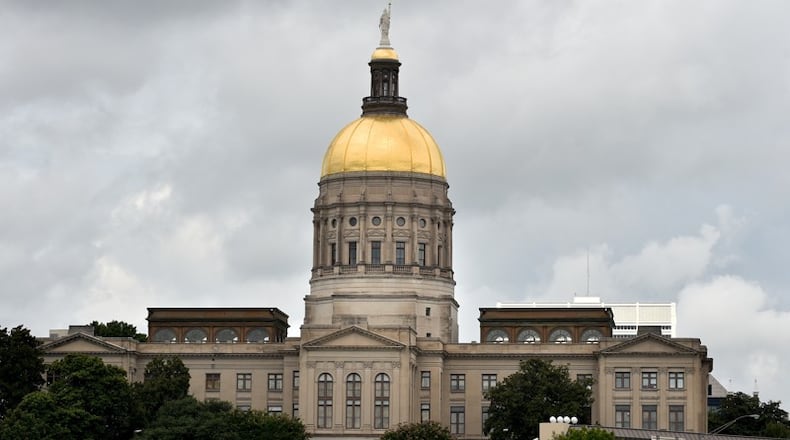Georgia Democrats strung together improbable victories on Tuesday night, emboldening partisans who hope their strong performance is a prelude to next year's statewide vote – and the beginning of a forceful rebuke of President Donald Trump.
Democratic newcomers flipped two state House seats in northeast Georgia considered so conservative that the party hasn't even contested them since the lines were redrawn in 2012. And Democrats captured an Atlanta-based state Senate district long held by a Republican, breaking the GOP super-majority in the chamber.
The Georgia results were but a ripple of the national wave that engulfed Republican gubernatorial candidates in Virginia and New Jersey. And with a wide-open race for governor next year, Democrats Stacey Abrams and Stacey Evans trumpeted the results as validation of their strategies.
Supporters of Abrams said Lt. Gov. Ralph Northam’s victory in Virginia said it confirms their approach to the election, which hinges on energizing the party's base. Her campaign said it was "proof that the momentum is on our side going into 2018."
And Evans backers said Northam’s success in districts carried by Trump, coupled with the Democratic wins in Georgia GOP strongholds, shows there’s an opening for Democrats like her who aim for disaffected Republican voters.
And Democrats of all stripes saw the votes as a warning shot to Republicans who cling too closely to Trump.
“The results are a rejection of Trump – it’s clear as day,” said state Rep. Scott Holcomb, D-Atlanta. “Republicans who continue to embrace him can start the countdown on their political careers.”
Republicans didn’t bother trying to spin the defeats in House districts covering parts of Athens and Watkinsville late Tuesday. Trump had carried both districts in November, and Republicans mounted solid and well-financed contenders for the seats.
"It's a testament to the importance of a party contesting every seat possible," said Republican operative Todd Rehm. "Kudos to Georgia Democrats for their recruitment efforts."
He added that he's not sure what kind of precedent the votes set, since special elections are imperfect predictors of midterm votes. But he warned that the results will likely spur a new Democratic mission to contest all possible elections, even in deeply conservative areas.
Democrats couldn't capitalize on Trump's struggles in metro Atlanta last year because the party failed to put forward credible contenders - or any at all - in dozens of races. Only 31 of the 180 state House seats in Georgia featured candidates from both parties. An Associated Press analysis found that uncontested rate of 83 percent was the highest in the nation.
House Minority Leader Bob Trammell said finding willing Democratic recruits shouldn't be a problem next year. Already, the party has drafted at least a half-dozen candidates for GOP-held seats in Atlanta's northern suburbs. He said the "tremendous receptiveness and enthusiasm" should spur more recruits.
"We have a lot of seats where we haven't competed in a long time, but last night shows that when we contest races with credible candidates who run competitive campaigns, we are going to pick up seats in 2018," he said.
His Republican counterpart, House Speaker David Ralston, cautioned against reading too much into a "minor shift" of 1 percent of the chamber's 180 seats. He also made clear the two districts are atop the party's target list in 2018.
"Our House Republican Caucus and Georgia GOP are already working to reclaim those seats lost last night in next year's elections when a greater percentage of Georgians will go to the polls," said Ralston.
Republicans are also defending a slate of open statewide seats in next year's vote, and the four leading GOP contenders running for governor are already engaged in a race to the party's conservative flank on "religious liberty," illegal immigration and other hot-button issues.
State Sen. Michael Williams, a Republican running for governor on a pro-Trump platform, quickly posited that Republican Ed Gillespie was defeated in part because GOP primary voters overlooked other candidates who more ardently backed the president.
“For Republicans to continue winning elections, we have to elect pro-Trump conservative Republicans who are willing to take on the establishment of both parties,” said Williams.
Democrats privately saw the Athens-based seat as their biggest pickup opportunity. Athens is a liberal bastion, but the district encompasses only encompasses about half of the city – and stretches east to include conservative territory in nearby rural counties.
Republicans consolidated around Houston Gaines, a 22-year-old former student government president at the University of Georgia and budding political operative. He was the campaign manager for Athens Mayor Nancy Denson, and her support for him lead to her ouster from the local Democratic party.
But Democrat Deborah Gonzalez, a media and entertainment attorney, swept to a 6-point victory fueled by a two-to-one margin in Athens-Clarke County and solid support in other parts of the district.
The Watkinsville-based seat came as the bigger shock. Jonathan Wallace, a software engineer, trounced his three Republican opponents with 57 percent of the vote. He dominated the Athens sliver of that district and won a plurality of the vote in Oconee County, which Trump carried with two-thirds of the vote in November.
The results of Tuesday’s vote also seem likely to spark other Democrats to embark on campaigns once written off as longshots - and prod higher-profile potential candidates to take another look at their options.
Democrat Jon Ossoff, who lost this year's epic battle for the 6th Congressional District, still hasn't said whether he will challenge Republican Rep. Karen Handel next year. But he made clear on Tuesday that he was watching.
“This is a great night for our country,” he tweeted, adding: “Historic and decisive wins in Georgia tonight.”
About the Author
The Latest
Featured




